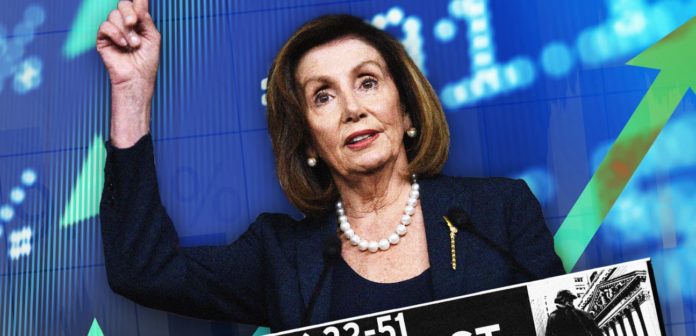House Democrats introduced Tuesday’s “Combatting Financial Conflicts of Interest in Government Act”, which would prohibit federal employees from trading stocks. This legislation was introduced to address conflicts of interest previously reported on the Hill, and to prevent future abuses.
If passed, this legislation would be applicable to members of Congress, each officer or employee of legislative branch, the president, vice president, presidential appointees, federal judges, members of Board of Governors of Federal Reserve, and the President of the Fed. The ban would also apply to the spouses and dependent children of these individuals.
These individuals are prohibited from trading or owning securities, commodities futures, cryptocurrencies, digital asset “or any similar economic interest acquired by synthetic means.” They would have to either sell their holdings or transfer them into a qualified blind trust.
At the discretion of the ethics officer, those who violate these restrictions may be subject to a $1,000 penalty.
The New York Times published earlier this month findings that revealed that at least 97 Congressmen were guilty of these conflicts. They bought and sold stocks, bonds or other financial assets in order to “intersect with their congressional work.”
There were 149 possible conflicts among the trades of California Democrat Rep. Ro Kanna in 897 companies.
Khanna, who was a member of the Agriculture Committee, had reportedly traded in Deere & Co., an agricultural company, and other impacted businesses.
His trades were Raytheon Technologies, General Electric and Boeing while he was on the Armed Services Committee.
Khanna was a member of the Oversight Subcommittee on Economic and Consumer Policy and traded in Pfizer and Johnson & Johnson as well as Medtronic and a host other effected businesses.
Lowenthal, a member of the Transportation Committee, saw it fit to trade in Uber and Boeing as well as General Motors.
The remedy proposed
Although Speaker Nancy Pelosi had rejected the initiative last year in her House of Representatives, she gave direction to Rep. Zoe Lofgren (D.Calif.) that the bill be drafted in February.
Initial support for the bill was strong when Sen. Richard Burr (R.N.C.), revealed that he had dumped stocks following a classified briefing on the COVID-19 threat at onset of the pandemic.
Senator Minority Leader Mitch McConnell (R-Ky.), indicated that he would support the ban at the time of Pelosi’s February announcement.
Republican Senator Josh Hawley stated, “Year after Year, politicians somehow manage outperform the markets, buying and selling million in stocks of companies that they’re supposed be regulating.” … We can ban members of Congress trading stocks, and force those who do to return their profits to the American people.
Hawley stated, “It is time to stop turning your blind eye to Washington profiteering.”
Although there were indications that the bill would soon be introduced, it was delayed for a long time.
After the New York Times revealed that Paul Pelosi, her husband, had purchased and sold stocks worth between $25 million to $81 million between 2019 and 2021 (including those tied to businesses affected by congressional scrutiny), Pelosi was asked about why it took so long.
Pelosi stated that there was a lot of back-and forth about the language but that the latest version had come out “strong.”
Wednesday was the third day of legislative business before the midterm elections. Washington will be bailed out by the House on Friday and business will cease until November.
If the bill isn’t passed by the House this week, it will need to be re-examined for several months. The House’s body could change significantly during that time.
Pelosi may not return to the House as speaker if she does. Pelosi may not have to worry about this bill being passed or applied if there is a Republican majority in Congress.
The Hill reported that Pelosi has been on an international trip for the past year, which she called her “swan song.”
It has been suggested that she wants to be the U.S. ambassador in Italy. Some believe that the post, currently vacant, but for Shawn Crowley as a temporary charge d’affaires, would be a good landing spot for an Italian-American to lead U.S. House.
Fox Business Network was recently informed by an anonymous source that Pelosi can get the job if she so desires.
The appeal of the Rome Embassy, which has a three-story, $1.1million wine cellar and a private theatre, swimming pool, tennis court and private theater, is not lost on House Democrats. However, parking Pelosi overseas might prove to be politically advantageous for them, providing them with a less contentious leadership transition.
Pelosi, who is an ambassador, falls under the proposed ban. However, it is possible that she might not want to trade.
Pelosi was exempted from the New York Times analysis of conflicts of interest because “her disclosure filings weren’t flagged” since she “doesn’t sit on any legislative commissions.” However, her husband Paul enjoyed a remarkable amount of luck in the market while she was in Congress. Some have considered him to be the beneficiary of more that preternatural prescience.
Paul Pelosi recently purchased between $1 million to $5 million of Nvidia shares (20,000 share) on June 17. His investment in Nvidia was quickly followed by legislative moves to increase corporate subsidies to U.S. semiconductor production to over $70 billion. This prompted his shares to rise in value.
Paul Pelosi purchased close to $10 million of Microsoft shares via call options on March 19, 2021 days before the company received a $22 billion contract from the U.S. Army. The stock rose 12% by April.
Paul Pelosi purchased $1 million worth of Tesla stock just before Biden signed an executive order to replace federal automobile fleets with electric vehicles. According to the Washington Times, he made 21% on his investment.
Paul Pelosi also placed significant bets in Amazon, Apple and Google. These tech giants are part of the technology behemoths Nancy Pelosi must regulate.
Nancy Pelosi’s net worth is estimated to be over $100 million. Her average annual salary is $200,000.




